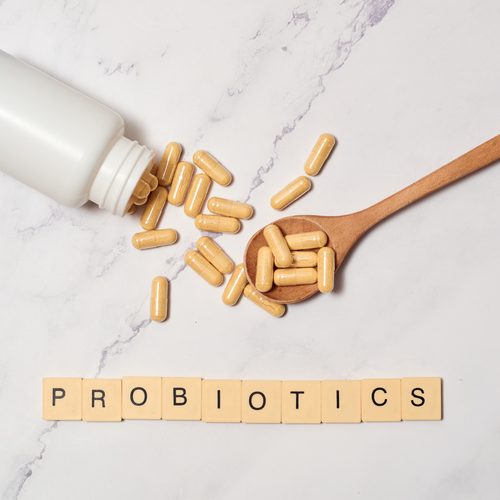What to remember:
The intestinal microbiota is a key ecosystem for digestion and digestive transit, immunity and the overall balance of the body.
An imbalance (dysbiosis) can manifest itself through digestive disorders, fatigue, decreased immunity or mood disorders.
The main causes are an unbalanced diet, antibiotics, stress, a sedentary lifestyle and certain pollutants.
To rebalance your flora , you need to favor fibers, fermented foods and limit ultra-processed products.
A healthy and sustainable lifestyle (sleep, physical activity, stress management, everyday products) is essential to support the microbiota.
Introduction: What exactly is intestinal flora?
Also called intestinal microbiota, intestinal flora refers to all the microorganisms (bacteria, yeasts, viruses, etc.) that live in our intestines — nearly 100,000 billion!
It is even akin to a full-fledged organ: it weighs around 2 kg and plays a fundamental role in our health.
Its balance is fragile but crucial: when certain bacteria become dominant or diversity decreases, the entire organism can suffer. This is called intestinal dysbiosis, and it can have more or less long-term consequences for the body.
Why is it important to take care of your intestinal flora?
#1 - A key ecosystem for global health
The intestinal microbiota plays an essential role in our health:
-
Metabolic role : it promotes digestion, particularly by allowing the fermentation of indigestible foods and the absorption of nutrients (amino acids, sugars, vitamins, etc.) by intestinal cells. It participates in the synthesis of metabolites (short-chain fatty acids, vitamins K, B12, B8).
-
Barrier role : it forms a shield against microbes, toxins, etc. It is involved in the production of protective mucus for intestinal cells.
-
Defense role : it allows the development of the intestinal immune system.
-
Maintenance role : it participates in the maturation of the digestive tract, the maintenance of the intestinal mucosa, the production of mucus and the enzymatic activity of the mucosa.
However, an alteration of this balance, called dysbiosis, can lead to various problems, including digestive disorders, persistent fatigue , mood disorders, a drop in immunity and skin problems.
#2 - Warning signs of an unbalanced microbiota
An imbalanced gut microbiota—a state of dysbiosis—can manifest itself in several ways, sometimes well beyond digestive disorders alone. According to Inserm, an alteration in the composition of the microbiota is frequently associated with:
-
Digestive disorders : bloating, abdominal discomfort, diarrhea, constipation or alternating between the two are often the first visible signs.
-
Exposure to infections : the microbiota plays a key role in immunity, and its imbalance can weaken the body's natural defenses.
-
Inflammatory or metabolic diseases : numerous studies show a link between dysbiosis and certain pathologies such as obesity, type 2 diabetes, IBD (chronic inflammatory bowel diseases), or even certain cancers.
-
An impact on the brain and behavior : the microbiota communicates with the central nervous system via the gut-brain axis. An imbalance could be involved in the onset or worsening of mood disorders (anxiety,depression ) or neurological disorders (autism spectrum disorders, Parkinson's disease).
These signals should not be interpreted in isolation, but they may prompt questions about the state of one's intestinal flora, particularly if they are chronic or associated with each other.
#3 - The causes of an imbalance
The gut microbiota is a living and fragile ecosystem, influenced by numerous environmental factors. When it becomes unbalanced, it can contribute to the onset or worsening of various pathologies. Here are the main causes identified in the scientific literature:
-
The Modern Western Diet : A diet high in sugars and saturated fats, but low in fiber and fermented foods, is one of the major factors associated with dysbiosis. This type of diet promotes the growth of potentially pro-inflammatory bacteria at the expense of beneficial bacteria.
-
Antibiotic use : Broad-spectrum antibiotics, especially when used repeatedly or inappropriately, profoundly alter the diversity and composition of the microbiota. Some beneficial strains may disappear entirely or take several months to recover.
-
Psychological stress : Chronic stress activates the hypothalamic-pituitary-adrenal axis and induces changes in intestinal permeability , which can negatively impact the balance of the microbiota by establishing chronic low-grade inflammation.
-
Sedentary lifestyle : Lack of regular physical activity has been associated with lower bacterial diversity, an important marker of a healthy microbiota.
-
Intestinal infections or diseases : Certain gastrointestinal infections, chronic inflammations or metabolic diseases can disrupt the microbial composition by promoting the proliferation of pathogenic bacteria.
-
Other environmental factors : Pollution, food additives, certain medications (nonsteroidal anti-inflammatory drugs, proton pump inhibitors), or even a cesarean birth are also mentioned as being able to alter the colonization and balance of the microbiota.
Thus, many elements of modern lifestyle contribute to weakening the richness and resilience of our intestinal flora, with potential repercussions on our overall health.
How to rebalance your intestinal flora?
#1 - Adopt a diet that is favorable to the microbiota
Eating better (and differently) is essential to improving the environment of intestinal bacteria and thus promoting their development. Here are some ideas to follow:
-
Increase prebiotic fiber consumption Dietary fiber, found in cooked and cooled fruits, vegetables, legumes, whole grains, oilseeds, and starchy foods, is essential for feeding the beneficial bacteria in the gut microbiota. A diet rich in fiber promotes microbial diversity and contributes to better gut health.
-
Incorporate fermented foods for their richness in natural probiotics : Regular consumption of fermented foods such as yogurt, kefir , kombucha , sauerkraut, miso and lacto-fermented tofu can enrich the diversity of the intestinal microbiota thanks to a significant intake of natural probiotics and thus reduce markers of inflammation.
Note that probiotics contribute to the balance of intestinal flora. -
Reduce refined sugars and ultra-processed foods : A diet high in added sugars and processed foods can disrupt the balance of the microbiota, promoting the growth of pathogenic bacteria and contributing to metabolic imbalances.
-
Favor raw, seasonal, and organic foods : Pesticides in some foods can alter the composition of the gut microbiota. Choosing organic and seasonal products can reduce exposure to these substances.
-
Home cooking : Preparing your meals allows you to control the ingredients and cooking methods, promoting a healthier diet that is beneficial for the microbiota.
#2 - Sustainably improve your lifestyle
Diet is essential for improving the gut microbiota, but without a healthy and balanced lifestyle, it will be of little use. Here are some tips to implement:
-
Engage in regular physical activity : Moderate exercise is associated with an increase in gut microbial diversity , which is beneficial for overall health.
-
Managing stress Chronic stress can disrupt the balance of the gut microbiota. Relaxation techniques, such as meditation, yoga, or cardiac coherence, can help maintain healthy intestinal flora by positively regulating stress.
-
Ensure quality sleep : Insufficient or poor quality sleep can negatively affect the gut microbiota . Ensuring regular sleep habits is essential for gut health.
-
Pay attention to everyday products : Some household products, cosmetics, or food containers, such as those made of plastic, may contain chemicals that can disrupt the microbiota in the long term. Opting for more natural alternatives can be beneficial: stainless steel pans, simple household products (black and Marseille soap, white stone, citric acid, etc.), glass containers, organic cosmetics, etc.
-
Be patient : Restoring a balanced microbiota is a gradual process. Sustainable changes in diet and lifestyle are necessary for long-term results.
Conclusion
A true conductor of our overall health, the intestinal microbiota deserves our full attention. This vast ecosystem, composed of billions of microorganisms, plays a central role in digestion, immunity, intestinal barrier protection, and even our psychological balance. But this precious ally is also highly sensitive: our modern lifestyle—processed diets, chronic stress, a sedentary lifestyle, pollution, and even the repeated use of antibiotics—can easily disrupt its balance, paving the way for numerous functional or chronic disorders.
Good news: it's possible to take action! By reintroducing more fiber, fermented foods, and raw products into our diets, reducing our exposure to everyday stressors, and adopting a lifestyle that's more respectful of our biology (physical activity, sleep, stress management, etc.), we're providing our intestinal flora with the ideal conditions to regenerate.
Taking care of your microbiota means investing in your present and future health—step by step, consistently and with kindness.
Source :
[1] Inserm, 2021, Intestinal microbiota (intestinal flora): A serious avenue for understanding the origin of many diseases, consulted from: https://www.inserm.fr/dossier/microbiote-intestinal-flore-intestinale/
[2] Hrncir T. (2022). Gut Microbiota Dysbiosis: Triggers, Consequences, Diagnostic and Therapeutic Options. Microorganisms, 10(3), 578. https://doi.org/10.3390/microorganisms10030578
[3] Oligschlaeger, Y., Yadati, T., Houben, T., Condello Oliván, CM, & Shiri-Sverdlov, R. (2019). Inflammatory Bowel Disease: A Stressed “Gut/Feeling”. Cells, 8(7), 659. https://doi.org/10.3390/cells8070659
[4] Shang, Z., Pai, L., & Patil, S. (2024). Unveiling the dynamics of gut microbial interactions: a review of dietary impact and precision nutrition in gastrointestinal health. Frontiers in nutrition, 11, 1395664. https://doi.org/10.3389/fnut.2024.1395664
[5] Monda, V., Villano, I., Messina, A., Valenzano, A., Esposito, T., Moscatelli, F., Viggiano, A., Cibelli, G., Chieffi, S., Monda, M., & Messina, G. (2017). Exercise Modifies the Gut Microbiota with Positive Health Effects. Oxidative medicine and cellular longevity, 2017, 3831972. https://doi.org/10.1155/2017/3831972
[6] Sejbuk, M., Siebieszuk, A., & Witkowska, AM (2024). The Role of Gut Microbiome in Sleep Quality and Health: Dietary Strategies for Microbiota Support. Nutrients, 16(14), 2259. https://doi.org/10.3390/nu16142259















